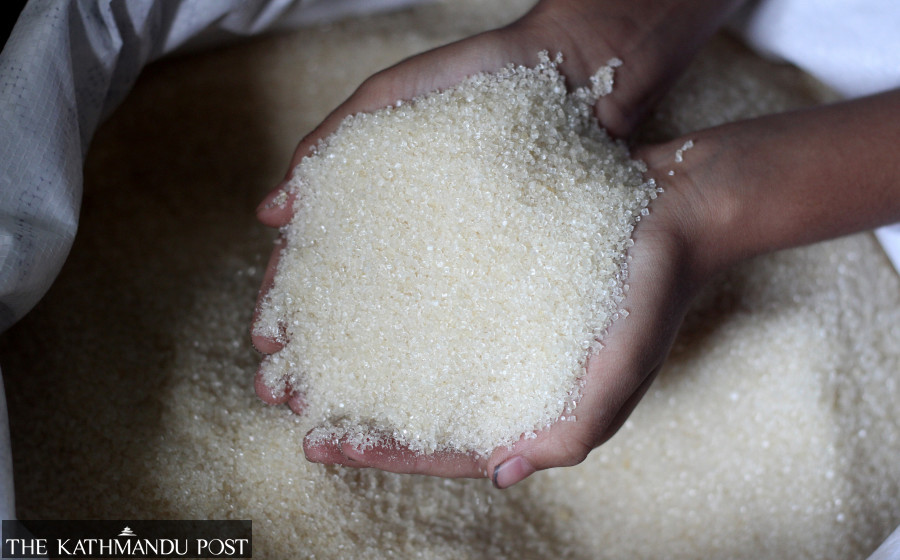Money
Flood of contraband sugar causing glut in market
Nepal’s annual sugar demand is 260,000 tonnes, the country produced 105,000 tonnes of the household sweetener in the last fiscal year.
Krishana Prasain & J Pandey
There is a sugar glut in the market because Indian products continue to flow in even though the southern neighbour has tightened exports, indicating that smuggling is rife, traders say.
Recently, the police in Nepalgunj confiscated 2,150 kg of the household sweetener that had been smuggled in from Lakhimpur, Khiri, India.
Arjun Kumar Neupane, chief of the Nepalgunj Customs Office, said sugar imports through the Nepalgunj border point had dropped sharply during the period mid-May to mid-June. But there is surplus inventory in the market, according to traders.
Between mid-February and mid-March, sugar imports through the Nepalgunj border point amounted to 5,764 tonnes worth Rs327.2 million.
From mid-March to mid-April, imports plunged to 1,635 tonnes worth Rs90.12 million. During the period mid-April to mid-May, imports doubled to 3,264 tonnes.
On May 25, the Indian government decided to limit sugar exports to 10 million tonnes effective from June 1. Traders need to get permission to ship sugar outside the country, according to the Indian government’s directives.
Following Russia's invasion of Ukraine, food prices have skyrocketed, and governments across the world have resorted to taking measures to protect domestic prices of certain commodities.
India is the world's biggest producer of sugar and the second largest exporter after Brazil.
Madhav Timalsina, president of the Consumer Rights Investigation Forum, said that the India restriction on sugar exports had not affected stocks in the market.
“But what has happened is that sugar that was available for Rs95 per kg now costs Rs110 per kg. Wholesalers are charging Rs97 to Rs100 per kg,” he said.
“Nepali traders have almost stopped importing sugar because they have to keep 100 percent margin amount to open a letter of credit as per the government's latest orders. This means sugar is not being imported through official channels. The market is filled with contraband.”
Timalsina says the government lacks a clear supply policy and is not sensitive towards the market. “The market may see shortages soon, and opportunist traders may hike prices again,” he said.
State-owned Salt Trading Corporation has also stopped imports. Information officer Kumar Rajbhandari said the government company had stopped importing sugar from the last two years.
The corporation had brought 20,000 tonnes of sugar two years ago, Rajbhandari said.
According to Rajbhandari, Nepal’s annual sugar demand is around 260,000 tonnes. The country produced 105,000 tonnes of the sweetener in the last fiscal year.
The private sector is importing sugar, but there is no clear communication from India about the import quota to be given to Nepali traders.
"India has not sent anything in writing regarding the sugar quota for Nepali importers. Importers also don't know from where to source the product,” said Neupane. “As a result, imports have started to drop.”
Traders say customs officials, the police and traders have been colluding to smuggle sugar through the porous Nepal-India border. According to traders, smugglers are taking advantage of India's new sugar export policy.
Nepal’s dependency on imported sugar has been increasing annually due to falling domestic production. India has not restricted exports of sugar for the production of soft drinks like Coca-Cola and Pepsi, according to Neupane.
Domestic sugar production has been declining annually as many farmers have stopped growing sugarcane because sugar mills never pay them on time for their crops.
The Maoist insurgency which started in 1996 dealt a severe blow to the sugar industry from which it has not been able to recover fully.
Gijra Khadsari Mill of Banke used to produce 2,000 quintals of sugar in three months. In January 2004, the factory was looted by the Maoists. The mill owners shut down operations citing lack of security, and around 100 workers lost their jobs.
“The factory collapsed and never revived,” said Ajay Tandon, then proprietor of the mill. “We asked the Home Ministry for security many times, but the government did not respond,” he said.
“The first sugar factory in Banke was looted, but no justice has been given,” Tandon said.
Basuling Sugar Mill of Kailali also got closed due to the Maoist insurgency 17 years ago. Established with an investment of Rs900 million, the mill had its own 55-bigha sugarcane farm.
Proprietor Arun Chand said the mill had a capacity to crush 25,000 quintals of sugarcane daily and produce 300,000 quintals of sugar annually. The sugar produced by the company was being exported too.
“We are planning to operate the mill again, and have sought loans from banks,” said Chand. “But the banks are reluctant to issue credit as they are facing a liquidity crisis.”




 22.3°C Kathmandu
22.3°C Kathmandu















